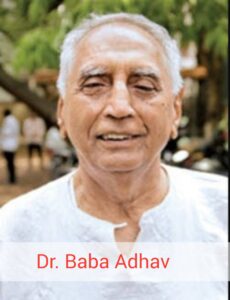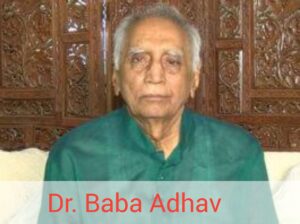Dr. Baba Adhav Biography, Age, Net Worth, Achievement

Dr. Babasaheb Pandurang Adhav, fondly known as Baba Adhav, is a renowned Indian social activist and trade unionist born on June 1, 1930, in Pune, Maharashtra. He is celebrated for his tireless efforts in advocating for the rights and welfare of unorganized and underprivileged daily wage workers, including head loaders, waste-pickers, and street vendors. Drawing inspiration from Mahatma Jyotiba Phule, Dr. Babasaheb Ambedkar, and Mahatma Gandhi, Dr. Adhav has been instrumental in securing social security, legal protection, and dignity for these workers. His notable achievements include the establishment of the Hamal Panchayat and the implementation of the Maharashtra Mathadi Hamal and Other Manual Workers Act.
Dr. Baba Adhav Biography
Dr. Babasaheb Pandurang Adhav, fondly known as Baba Adhav, is a prominent Indian social activist and trade unionist born on June 1, 1930, in Pune, Maharashtra. His life’s work has been dedicated to advocating for the rights and welfare of unorganized and underprivileged daily wage workers, such as head loaders, waste-pickers, and street vendors. Dr. Adhav’s efforts have significantly impacted the lives of these workers, ensuring they receive social security, legal protection, and a dignified existence.
Dr. Adhav’s early life was marked by hardship. His father, Pandurang, passed away when Baba was just three months old, leaving his mother, Babutai Pandurang Adhav, to raise him and his four siblings. Despite these challenges, Baba excelled in his studies, attending Pune Municipal Corporation’s public school and later Shivaji Maratha School. In 1952, he graduated from Tarachand Ramnath Ayurveda College and began his medical practice in his hometown.
Inspired by the teachings of Mahatma Jyotiba Phule, Dr. Babasaheb Ambedkar, and Mahatma Gandhi, Dr. Adhav became deeply involved in social activism. His commitment to social justice was further fueled by his association with socialist leaders like S. M. Joshi, N. G. Gore, and Rammanohar Lohia. These influences shaped his secular and forward-thinking approach to addressing the issues faced by marginalized communities.
One of Dr. Adhav’s most significant contributions is the establishment of the Hamal Panchayat, a trade union for head loaders. This organization played a crucial role in advocating for the rights of these workers, including the implementation of minimum wages and better working conditions. His efforts led to the creation and enforcement of the Maharashtra Mathadi Hamal and Other Manual Workers Act, which provided legal protection and benefits to manual laborers.
Dr. Adhav’s activism extended beyond labor rights. He was instrumental in the Ek Gaav, Ek Panavtha (One Village, One Pond) movement, which aimed to ensure that Dalits, or untouchables, had access to water in rural Maharashtra. This initiative highlighted his commitment to addressing caste-based discrimination and improving the living conditions of marginalized communities.
Throughout his career, Dr. Adhav has worked tirelessly to influence state authorities to enact progressive legislation. His advocacy efforts contributed to the passage of the Slum Rehabilitation Act, the Dam and Project-Affected Rehabilitation Act, and the Devdasi Rehabilitation Act. These laws have provided much-needed support and protection to vulnerable populations in India.
Dr. Adhav’s personal life has also been marked by dedication and resilience. He married Sheela Garud in 1966, and together they raised two sons, Aseem and Ambar. Sheela worked as a nurse, supporting the family while Dr. Adhav continued his social activism.
In summary, Dr. Baba Adhav’s life and work have had a profound impact on the lives of unorganized and underprivileged workers in India. His relentless advocacy for social justice, legal protection, and dignity for these workers has made him a revered figure in the field of social activism. Dr. Adhav’s legacy serves as an inspiration for future generations to continue the fight for equality and justice for all.
Dr. Baba Adhav Age
Dr. Babasaheb Pandurang Adhav, fondly known as Baba Adhav, was born on June 1, 1930, in Pune, Maharashtra, India. As of now, he is 94 years old. Dr. Adhav is a renowned social activist and trade unionist, celebrated for his tireless efforts in advocating for the rights and welfare of unorganized and underprivileged daily wage workers. His work has significantly impacted the lives of many, ensuring they receive social security, legal protection, and dignity.
Dr. Baba Adhav Net Worth
There isn’t specific information available about Dr. Baba Adhav’s net worth. Unlike many prominent figures, Dr. Adhav is known for his lifelong dedication to social activism and improving the lives of unorganized and underprivileged workers rather than accumulating personal wealth. His work has focused on securing social security, legal protection, and dignity for daily wage workers, head loaders, waste-pickers, and street vendors in India.
Dr. Adhav’s legacy is measured more by the positive impact he has had on countless lives rather than financial metrics. His contributions to social justice and labor rights have earned him immense respect and recognition.
Dr. Baba Adhav Family
Dr. Babasaheb Pandurang Adhav, fondly known as Baba Adhav, was born into a family that faced significant challenges early on. His father, Pandurang, passed away when Baba was just three months old, leaving his mother, Babutai Pandurang Adhav (née Zende), to raise him and his four siblings—one elder brother and three sisters¹. The family was supported by Babutai’s brother, Bapusaheb Zende, and they lived in Nana Peth, Pune.
In 1966, Dr. Adhav married Sheela Garud, who worked as a nurse throughout her career. Together, they have two sons, Aseem and Ambar¹. Despite the demands of his social activism, Dr. Adhav has always been deeply committed to his family, balancing his professional and personal responsibilities with dedication and resilience.
Dr. Adhav’s family has been a source of support and strength throughout his journey, enabling him to focus on his mission of advocating for the rights and welfare of unorganized and underprivileged workers in India.
Dr. Baba Adhav Education
Dr. Babasaheb Pandurang Adhav, fondly known as Baba Adhav, has had a remarkable educational journey that laid the foundation for his impactful career in social activism and trade unionism.
Born on June 1, 1930, in Pune, Maharashtra, Dr. Adhav faced significant challenges early in life. Despite these hardships, he excelled academically. He began his education at a public school run by the Pune Municipal Corporation. His early schooling was marked by dedication and hard work, which set the stage for his future endeavors.
After completing his primary education, Dr. Adhav attended Shivaji Maratha School in Pune for his higher education. His academic performance continued to be exemplary, reflecting his commitment to learning and personal growth.
In 1952, Dr. Adhav graduated from Tarachand Ramnath Ayurveda College in Pune, earning a degree in Ayurvedic medicine. This achievement was particularly significant given the socio-economic challenges he faced growing up. His education in Ayurveda not only provided him with a professional qualification but also instilled in him a deep understanding of traditional Indian medicine and its role in community health.
Following his graduation, Dr. Adhav began his medical practice in his hometown of Pune. He set up his practice in his home in Nana Peth, where he provided medical care to the local community. His work as a physician was characterized by a strong sense of social responsibility and a commitment to serving the underprivileged.
Dr. Adhav’s educational background and medical practice played a crucial role in shaping his approach to social activism. His medical training provided him with a unique perspective on the health and welfare of the laboring poor, which became a central focus of his activism. He was inspired by the teachings of prominent social reformers such as Mahatma Jyotiba Phule, Dr. Babasaheb Ambedkar, and Mahatma Gandhi, whose ideas influenced his work and philosophy.
Throughout his career, Dr. Adhav has been a tireless advocate for the rights of unorganized and underprivileged workers. His educational journey, marked by perseverance and a commitment to social justice, has been instrumental in his efforts to secure social security, legal protection, and dignity for daily wage workers, head loaders, waste-pickers, and street vendors in India.
In summary, Dr. Baba Adhav’s educational career is a testament to his resilience and dedication. From his early schooling in Pune to his graduation from Tarachand Ramnath Ayurveda College, his academic achievements have been the bedrock of his lifelong commitment to social activism and the welfare of marginalized communities.

Dr. Baba Adhav Parents
Dr. Babasaheb Pandurang Adhav, fondly known as Baba Adhav, was born into a family that faced significant challenges early on. His father, Pandurang, had an established lentil distribution business, but it was severely affected by the Great Depression of 1930. Tragically, Pandurang passed away when Baba was just three months old.
Baba Adhav’s mother, Babutai Pandurang Adhav (née Zende), played a crucial role in his upbringing. After the death of her husband, Babutai moved back to her maternal home in Nana Peth, Pune, where she raised Baba and his four siblings—one elder brother and three sisters—with the support of her brother, Bapusaheb Zende. Despite the hardships, Babutai’s resilience and dedication ensured that her children received a good education and moral upbringing.
Babutai’s strength and determination greatly influenced Baba Adhav’s values and commitment to social justice. Her ability to navigate the challenges of single parenthood during such difficult times left a lasting impression on him, shaping his future endeavors in advocating for the rights and welfare of the underprivileged.
Dr. Baba Adhav Achievement
Dr. Babasaheb Pandurang Adhav, fondly known as Baba Adhav, has made significant contributions to social activism and labor rights in India. Here are some of his most notable achievements:
- Establishment of the Hamal Panchayat: Dr. Adhav founded the Hamal Panchayat, a trade union for head loaders, which played a crucial role in advocating for their rights. This organization was instrumental in securing minimum wages and better working conditions for these workers.
- Maharashtra Mathadi Hamal and Other Manual Workers Act: One of Dr. Adhav’s most significant accomplishments was the creation and implementation of this act. It provided legal protection and benefits to manual laborers, ensuring they received fair wages and improved working conditions.
- Ek Gaav, Ek Panavtha Movement: Dr. Adhav initiated this movement, which translates to “One Village, One Pond,” to ensure that Dalits, or untouchables, had access to water in rural Maharashtra. This initiative was a significant step towards addressing caste-based discrimination and improving the living conditions of marginalized communities.
- Advocacy for Progressive Legislation: Dr. Adhav has been a tireless advocate for progressive legislation. His efforts have contributed to the passage of several important laws, including the Slum Rehabilitation Act, the Dam and Project-Affected Rehabilitation Act, and the Devdasi Rehabilitation Act. These laws have provided much-needed support and protection to vulnerable populations in India.
- Recognition and Awards: Dr. Adhav’s work has been widely recognized. He received the Times of India Social Impact Award for Lifetime Contribution, acknowledging his decades of struggle to ensure social security for unorganized labor.
Dr. Baba Adhav’s achievements reflect his unwavering commitment to social justice and the welfare of unorganized and underprivileged workers. His efforts have significantly improved the lives of many, ensuring they receive the dignity, legal protection, and social security they deserve.
Dr. Baba Adhav Challenges In Activism
Dr. Baba Adhav faced numerous challenges throughout his activism, reflecting the complexities and resistance often encountered in social justice work. Here are some of the key challenges he faced:
- Economic Hardships: Coming from a modest background, Dr. Adhav experienced financial difficulties, especially after the death of his father. These hardships continued into his early career, making it challenging to balance his medical practice with his activism.
- Resistance from Authorities: Dr. Adhav often faced resistance from government authorities and employers who were reluctant to implement labor reforms. His efforts to secure legal protections and fair wages for unorganized workers were met with significant opposition.
- Social and Caste Discrimination: Working in a society deeply divided by caste, Dr. Adhav’s initiatives, such as the Ek Gaav, Ek Panavtha movement, aimed at ensuring water access for Dalits, faced strong resistance from upper-caste communities. Overcoming entrenched social prejudices was a constant struggle.
- Organizing Unorganized Workers: One of the biggest challenges was organizing unorganized workers, such as head loaders, waste-pickers, and street vendors, who often lacked awareness of their rights and were scattered across various locations. Mobilizing these workers and uniting them under a common cause required immense effort and perseverance.
- Legal and Bureaucratic Hurdles: Implementing progressive legislation like the Maharashtra Mathadi Hamal and Other Manual Workers Act involved navigating complex legal and bureaucratic systems. Dr. Adhav had to work tirelessly to ensure these laws were not only passed but also effectively enforced.
- Personal Sacrifices: Balancing his activism with personal life was another significant challenge. Dr. Adhav’s commitment to his cause often meant long hours and personal sacrifices, impacting his family life.
Despite these challenges, Dr. Baba Adhav’s resilience and unwavering dedication to social justice enabled him to make substantial contributions to the welfare of unorganized and underprivileged workers in India. His legacy continues to inspire future generations to fight for equality and justice.




One Comment